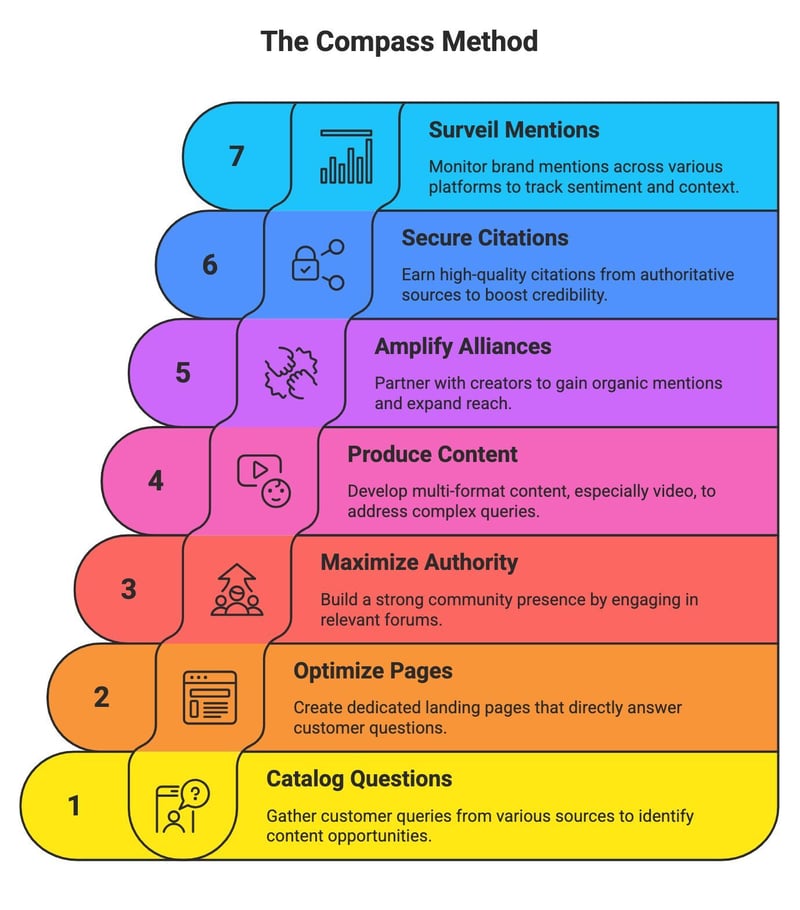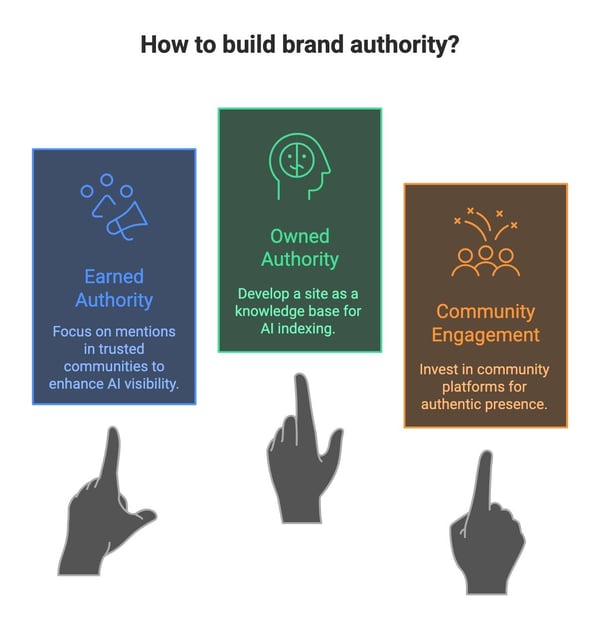The Startup Playbook for Winning AI-Driven Search
Discover how startups win modern SEO across Google, ChatGPT & Reddit. Learn the COMPASS Method for AI search dominance without enterprise resources or budgets.
Written by: Kevin Payne

Discover how startups win modern SEO across Google, ChatGPT & Reddit. Learn the COMPASS Method for AI search dominance without enterprise resources or budgets.
Written by: Kevin Payne

The search landscape has fundamentally shifted. AI platforms handle millions of queries daily, Reddit powers 40% of AI-generated answers, and over 20% of product discovery happens outside Google entirely. This new reality means startups don't need enterprise budgets or decade-old domains to dominate search; they just need to master the new rules of AI-powered SEO.
Few things excite me more than seeing startup teams punch above their weight in fast-changing digital spaces. During my years working with early-stage software companies and contributing to over 200 tech publications, I've watched founders outmaneuver enterprise brands by moving quickly and smartly. Nowhere is this more possible than in the new world of AI-powered SEO.
Yet most founders I advise still treat Google's classic playbook as gospel. That game is evolving, and this is your blueprint for dominating search, even if your brand just launched yesterday.
The old "just get backlinks and chase domain authority" era is behind us. Search is everywhere now. Google handles 17.5B daily searches, but that's only part of the story. AI platforms like ChatGPT, Google AI Mode, and Perplexity are handling millions of queries daily. Over 20% of product and service discovery now happens outside Google.
Some of my clients are already seeing more inbound leads from ChatGPT answers than classic Google SERPs. What does this mean for startups and scaleups? You don't need an enterprise-grade budget or a decade-old site to get discovered. You just need to know the new rules.
I've developed what I call the Three-Horizon Search Framework to help founders understand where discovery actually happens:
Horizon 1: Traditional search - Google's classic SERP results
Horizon 2: AI answer engines - ChatGPT, Claude, Perplexity responses
Horizon 3: Community discovery - Reddit, Discord, niche forums
Understanding all three horizons is critical because your customers are searching across all of them simultaneously.

When customers use AI search, the answer isn't pulled from one website or the top result. There's a chain of steps happening in the background:
Here's the key insight from my consulting work: LLMs value authenticity, citations, and context more than ever. Forty percent of Google AI answers come from Reddit, and sometimes Quora even overtakes Reddit for quality citations.
This represents both a threat and a huge opportunity for startups ready to build real community presence. As Simon Hoiberg often emphasizes in his micro-startup approach, small teams can now compete with enterprise companies by being authentic and community-focused.
Let me bust some prevailing myths I hear constantly:
Myth 1: "You need to write for LLMs"
Reality: Write for humans. Natural language and clear answers always win. Your audience wants real expertise and conversation-style content.
Myth 2: "llms.txt boosts AI visibility"
Reality: LLMs still look for trusted mentions, not files. Focus on building genuine authority.
Myth 3: "Schema guarantees an AI answer spot"
Reality: Schema markup is helpful but isn't magic. Grounded citations in high-quality sources matter more.
Myth 4: "LLMs pull from Google's top results"
Reality: Ranking on page one helps, but authentic community content powers over 40% of AI answers.
Myth 5: "You need secret tactics for AI Overviews"
Reality: Focus on great content and reputation. There's no trick or hack, just fundamentals.

After helping dozens of founders automate workflows and level up growth, I developed the COMPASS Method for modern SEO. This system works whether you're building a micro-startup or scaling an existing company:
Start by collecting every real question from sales calls, support tickets, DMs, and even in-person events. I've built question databases for my clients that become content goldmines.
Create dedicated landing pages for core customer questions. Forget generic keyword pages. In my experience working with Techstars and YC startups, the companies that win are those that answer specific questions directly.
This is where most startups win big. Join relevant forums and real conversations. Reddit powers nearly half of AI citations, and I've seen this firsthand with clients who invested time in authentic community building.
Building authentic community authority is about consistent value contribution. You can track your progress using HubSpot's AEO Grader to see how AI systems recognize your brand across different platforms.
Video content is core to AI search, especially for complex queries like how-tos and deep dives. During my time contributing to tech publications, I noticed AI models cite video answers when written content falls short.
Find creators already serving your audience and offer real value. Don't just pay for ad reads. In my advisory work, I've seen authentic, natural mentions carry exponentially more SEO weight than paid ads.
Quality beats quantity every time. One mention in a trusted industry blog equals 10 from random websites. I've tracked this metric across multiple client campaigns.
Use tools like Xfunnel, Brandwatch, and Talkwalker. I monitor not just Google SERPs but ChatGPT, Perplexity, Reddit, and more for my clients.
One reason I'm obsessed with automation is that startups can now run sophisticated SEO operations with lean teams. This is what I call Vibe Marketing - using AI and automation to create authentic, high-performing content at scale.
Here's my current stack for building and scaling micro-startups:
Product development: Webflow
Build landing pages and web apps visually without code. This lets you test ideas fast and create answer-focused pages without a development team.
Distribution: HeyGen
Create AI-powered video content at scale for multi-channel distribution. HeyGen paired with Blotato helps you maintain video presence across all three search horizons without manual recording.
Operations: N8N
Build custom automation workflows that handle repetitive SEO tasks like content optimization, keyword research, and performance monitoring.
What Simon Hoiberg and Riley Brown call "vibe coding" is revolutionizing how founders build digital properties. Instead of spending weeks on development, you can:
This approach lets you test the Answer Architecture System I teach my clients - creating comprehensive content libraries that AI models love to cite.
Through my work with software startups, I've learned that consistent brand naming across all platforms is critical for AI understanding.
Ensure your site has pages for pricing, FAQs, and product integrations that are public and up-to-date. LLMs prioritize fresh, factual data, especially for commercial intent queries.
Leverage Databox to create original benchmarks, small studies, and industry reports to ensure you get cited more often in AI answers. Even small sample sizes matter if you frame findings with transparency.
I've developed what I call the Community Authority Model to replace outdated domain authority thinking. This framework recognizes that mentions in trusted communities now matter more than traditional backlinks.
Earned authority
Get your brand mentioned on trusted sites, industry blogs, and community forums. Track which URLs LLMs pull answers from and focus outreach there.
Owned authority
Build your own site as a "mini knowledge base." Use Q&A hubs, detailed guides, and semantic structure for easy AI indexing.
When earned and owned strategies work together, you control both what the market says about you and how AI search engines perceive your brand.

I'm seeing firsthand how startups that invest time authentically in Reddit, Discord, Quora, and niche platforms drive AI visibility, even when their websites have limited domain authority.
Greg Isenberg has built multiple successful startups by tapping into communities first, products second. His approach validates what my data shows: authentic community presence drives discovery.
With Google making AI Mode the default and available in 180 countries, search traffic behaviors will only accelerate in their shift to multi-channel discovery.
Nearly a third of mobile searches are now voice-based. Optimize answers for conversational queries, claim "People Also Ask" spots, and use FAQs effectively.
Google Lens and image search require keyword-rich images, alt text, and video content. Optimize your visual content for discovery.
Prioritize video for product demos, how-tos, and founder Q&As. This is where I've seen the biggest wins for clients in 2024.
Classic SEO measured rankings. Modern AI SEO measures presence in answers. Here's what I track for clients:
Google Analytics is still handy for site traffic, but startups must also track off-site mentions for holistic SEO success. Tools like Mentions.so make this monitoring possible even for solo founders.
Based on my experience helping startups scale, here's your immediate action plan using the COMPASS Method:
Month 1: Audit and foundation
Month 2: Content and community
Month 3: Scale and partnerships
Ongoing: Iterate for freshness
AI isn't making SEO obsolete. It's giving startups a clearer path to impact. You don't need legacy domain authority, a massive content team, or deep pockets.
With smart automation using tools like HeyGen, Webflow, and N8N, careful mapping of customer questions through the COMPASS Method, community-first outreach guided by the Community Authority Model, and strategic entity optimization, every founder can get their brand included in AI's answer set.
During my years working with early-stage companies and contributing to hundreds of tech publications, I've learned this: the startups that win are those willing to adapt quickly and think differently about visibility.
If you're ready to rethink what visibility means, this is your unfair advantage. The playing field is leveling, and 2025 belongs to founders who embrace the new rules of search.
Whether you're building a micro-startup using vibe coding principles or scaling an existing company, these strategies work. The key is moving fast, staying authentic, and building real community authority.
GTM Engineer for Impact Ventures | I Build Revenue Systems That Match Your Mission | A16z, YC & Techstars Portfolio


Toby Howell from the Morning Brew Daily Podcast and Ben Sharf, the CEO and co-founder of Platter, offer valuable insights into leveraging content and media for marketing success.

Discover how startups are using AI with key stats, trends, and insights to help your early-stage company stay competitive and scale smarter.

Top AI adoption challenges faced by startups, along with the strategies needed to overcome them efficiently.
